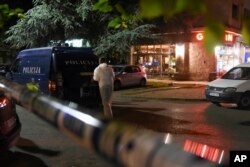Pete Cobus contributed to this report.
PODGORICA, MONTENEGRO — For criminally convicted investigative reporter Jovo Martinovic, several months of probation and indefinite international travel restrictions are a testament to his own journalistic integrity.
"I've worked many stories and had good contacts, journalistic and diplomatic, and I refused to put them into the service of the regime," he told VOA's Serbian Service, referring to his January 2019 conviction for drug trafficking and criminal association. "I refused to be an informant."
Serving an 18-month sentence that has been widely condemned by international media monitoring groups as a “terrible injustice” and a “disturbing setback” for press freedom in the country, Martinovic, a Montenegrin citizen who has reported extensively on organized crime in the Balkans for outlets such as The Economist, Time, Newsday, Vice, and The Financial Times, describes his conviction as the personal cost of maintaining a professional ethic.
The demands placed on him by government agencies and state security services, he said, are typical for his line of work throughout large parts of southeastern Europe, where, according to Reporters Without Borders (RSF), "decline in press freedom ...has gone hand in hand with an erosion of the region’s institutions by increasingly authoritarian governments."
"It used to be sometimes indirect," he told VOA, explaining that corrupt Montenegrin officials would tell him if he agreed to help cover up "certain topics and emphasize everything that is positive, you'll know that we'll appreciate it."
Investigative reporters like himself, he said, would be expected to pass their own findings directly to the government and "try to promote the regime story."
"I had a dozen of such offers," he said, "and I rejected them all."
“It seems clear that Martinovic’s conviction and sentence is intended to intimidate and chill the Montenegrin press,” said Polina Kovaleva, Eurasia project director for U.S.-based PEN America. “Martinovic was engaged in vital investigative journalism on a matter of significant public interest, and he is being punished for it. His conviction sends a disturbing message about the state of press freedom in Montenegro, especially for a country with ambitions to join the EU. We hope the appeal process will provide an opportunity for the truth to prevail.”
Martinovic, who has steadfastly denied the charges, calls his mafia contacts a product of his lengthy investigation of drug- and arms-trafficking in the region. He was first arrested in October 2015 while working on the investigation for CAPA Presse, a French TV production company, and subsequently held in preventive detention for 15 months, until being granted conditional release.
"Despite overwhelming evidence that his contact with criminals was due solely to his research into arms trafficking in the region," his January 2019 conviction, which drew outcry from the Committee to Protect Journalists, OSCE, Human Rights Watch, Freedom House, and Amnesty International, has been taken as a warning to fellow reporters, according to RSF.
RSF's 2019 World Press Freedom Index, published in April, offered a mixed review of the Balkans overall, noting substantial backsliding of press freedom in Serbia, Albania and Moldova, with marked improvements in Croatia and Kosovo, and North Macedonia, which moved up 14 places to 95th.
Serbia slipped 14 places to 90th, while Moldova slid 10 places to 91st. Albania, where organized crime reached "unprecedented levels" in 2018, the report said, fell from 75th to 82nd place.
Montenegro fell one spot to 104th, while Bosnia and Herzegovina slipped back one spot to 63rd place.
The top five slots were dominated by the Scandinavian nations of Norway (1), Finland (2), Sweden (3), and Denmark (5), with the nearby Netherlands taking 4th place.
The United States fell three spots to 48th in 2018, with RSF noting that American press freedom "has been under increasing attack over the past few years, and the first year of President Donald Trump’s presidency has fostered further decline in journalists’ right to report."
Last year, Montenegro investigative journalist Olivera Lakic was shot and wounded in Podgorica by an unidentified assailant. Lakic's apparent attempted murder came shortly after the assassinations of reporters Daphne Caruana Galizia in Malta and Jan Kuciak in Slovakia.
Milka Tadic Mijovic of the Center for Investigative Journalism of Montenegro said Martinovich's case has largely been taken as a warning by all Montenegrin reporters.
“This verdict will affect not only Jovo but other journalists in their work, and further deteriorate the country’s already-bad record in terms of freedom of expression and media,” she said in a prepared statement.
Montenegro, which hopes to join the EU by 2025, is under pressure to tackle organized crime and safeguard media freedom.
In May, the EU warned the Western Balkan country of 650,000 people that its efforts to join the bloc will suffer a setback unless it does more to protect journalists and media freedom.
This story originated at VOA's Serbian Service.





